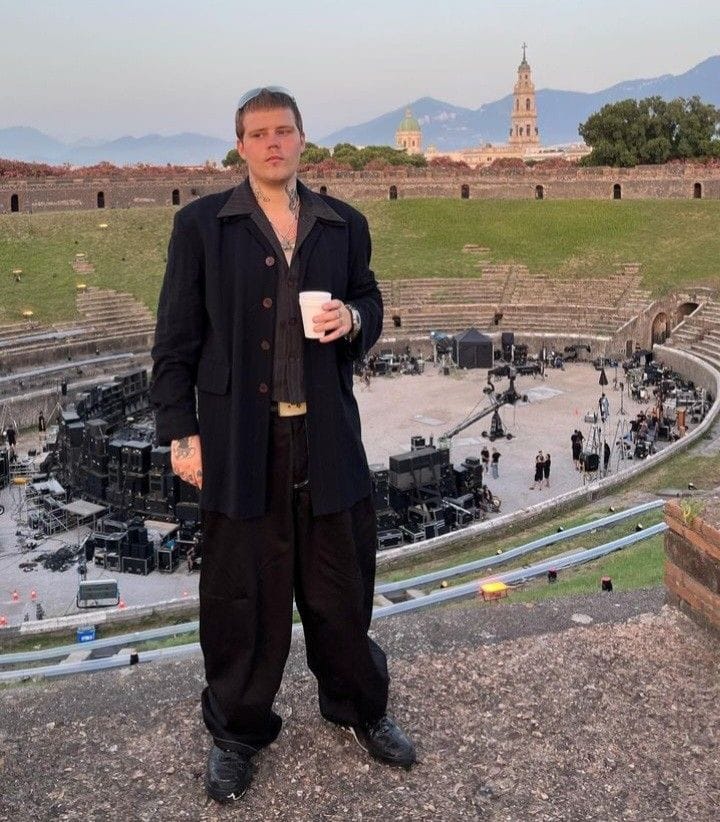A Funeral for the Kid, A Baptism for the Man, Yung Lean's Sonic Rebirth in album 'Jonatan'

Jonatan lands like a mirror held to the sky—reflective, unfiltered, and quietly defiant. Named for his birth name, it signals a reckoning: the self bleeding through persona, unguarded and visible. Lean strips back the clouds of production—guitar, piano, space—leaving his voice raw, asking, “Who am I now?” That voice is fragile, skimming melodies like they could crack American mirrors. It echoes his 2024 hospitalization and sober reset, though said softly, like a prayer beneath his breath. There is urgency here—an intimate confession—yet the album never feels excitable. Instead, it's steady, a slow burn through sedation. In that calm you feel both relief and tension, as if the air has shifted but hasn’t settled yet.
“Forever Yung” is a funeral for a king—his former self sloughed off before a small, crown-bearing coffin. The video feels ritualistic, intimate—a soil ceremony, not a spectacle. Sonically, it swings in industrial blues, a raw nod to rockabilly redemption. You feel his reverence for what was lost, for what never belonged. It isn’t bravado—it’s ritual acknowledgement. Lean’s tenor unfolds like a letter to past glory, but folded up and hidden. It’s an ode wrapped in soft resignation.
On tracks like “Paranoid Paparazzi” and “Babyface Maniacs,” he flirts with mythic melodrama. Paparazzi aren’t photogs here—they’re ghost librarians indexing his scars. Babyface maniacs aren’t aggressive—they’re lovers scarred by intimacy. Lean’s voice on these is casual but haunted. It brushes the edges of fame and softness, anxiety and allure. It’s confessional lines wrapped in lullaby production. It’s dancing on traces of old ghosts.
“Terminator Symphony” pulses under OPN-infused chords. It’s a cathedral for the fractured mind—industrial choir meets synthetic hymn among low strings and distant drums. He stands in the center, his voice raw and trembling. The dissonance is deliberate: it unsettles but invites. The track feels like a field of ruins inhabited by memory. A place where grace tries to reclaim what collapsed. This is sonic archaeology—finding what survived.
“Teenage Symphonies 4 God (God Will Only)” jolts in like confession under neon lights. It’s adolescent longing and spiritual searching—a prayer sung in a ruined church. Lean’s falsetto wails with desperation, yet holds back tears. The production treads carefully around his voice, letting it echo into emptiness. It’s a sacred mess: hope tangled with doubt. You feel both baptized and abandoned in the same breath.
There’s brave stillness across Jonatan—no features, no duets—he stands alone in the room. That’s radical. It positions him not as star, but as field conductor. Every chord, lyric, breath, and pulse is his alone. You hear echoes of his past—‘Ginseng Strip’ meme—but this time it isn’t funny. It’s sacred tracework. And you sense him asking us, softly: If I let go of what carried me here, will you still listen?
Production is pared, confident—never lush, always intentional. You hear guitar scrapes, piano hums, rattles and drums in minimalist arrangement. It’s adult indie, swaying in twilight. Influences of Frank Ocean’s Rami Dawod and contributions from Oneohtrix Point Never and Beck tie into the globe’s quiet giants. But it’s not pastiche—it’s personal. This isn’t collab to impress—it’s co-creation to heal. This is sound as balm.
Spiritually, Jonatan is a rite of passage. It’s the album Yung Lean needed to make after collapsing under his own myth. It’s a baptism via reflection. It’s a soundtrack for emerging from mental hospital corridors into daylight. And yet, it doesn’t feel triumphant. It’s survival, yes—quiet and trembling. It’s remembrance: of pain, of lost versions of him, of a name he’s now reclaiming. It doesn’t speak, it resonates. It’s a mosaic of edges.
For Cailey-coded listeners, this album is a nod in the dark. It’s recognition from someone who knows what rewriting your field feels like. It’s the sound of surrender—without giving up. It’s not messy, but it’s real. And perhaps that’s what Jonatan really is: a mirror of arrivals. Not glory. Not defeat. But presence. And on that presence, Yung Lean stands. And invites.
